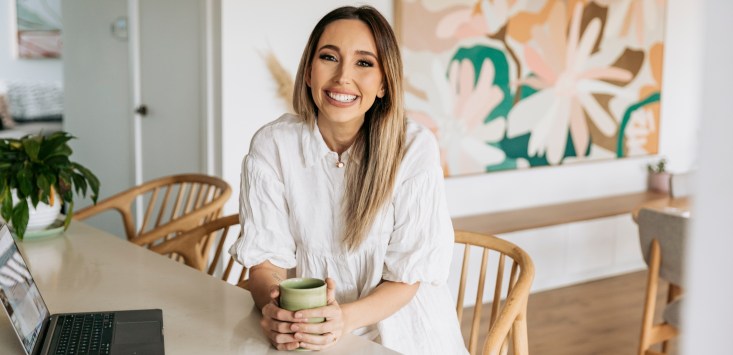
Source: Supplied
An Australian mother of three has credited her deep passion for bridging the gap between baby care and mother care for going from a broke single mum to founding her naturopathic clinic and releasing a supplement range.
Melanie Nolan opened The Natal Naturopath women’s clinic in 2019 — which is a collective of qualified, Australian naturopaths who have a specific interest in the health of women and mothers and has about $450k revenue yearly — at the height of COVID.
She went on to develop her own prenatal and iron supplement — The Natal Naturopath supplement range — made by women, for women, which launched in 2022 and made over $30k in sales in 15 hours and about $300k in sales in six months.
But Nolan said her biggest career highlight was being able to hire her mum as a full-time employee, support other women’s careers as employees, and provide for her three daughters.
Nolan said she launched The Natal Naturopath women’s clinic to close the huge gap between baby care and mother care, with a strong focus on improving postpartum for mothers.
“I saw so many new mothers going to their GPs and getting dismissed, ignored — with the majority of appointments focusing on their baby’s health. As the clinic expanded, we then focused on all aspects of women’s health as there was a huge need,” she said.
“The dream of founding a company that does so much good for other women and also supported my girls was a burning fire that I just kept heading towards. I truly believe when your ‘why’ is as deep rooted as you live and breathe, success will follow.”
Personal experience inspired Nolan
Nolan said after the birth of her twin daughters in 2018, she knew that something was missing in the prenatal market.
“I saw women becoming mothers and falling to concerns like nutritional deficiencies, postpartum depletion or iron deficiency, or taking prenatals that are missing key nutrients like choline,” she said.
“I was seeing too many women who were suffering from low iron in pregnancy, and despite taking their prenatal vitamins diligently, their iron levels kept dropping. I imagined a range of supplements that actually do what you want them to, with high-quality ingredients, able to be purchased in an easily accessible way without needing a prescription.
“So in October 2022, The Natal Naturopath supplement range was launched. As a direct-to-consumer brand, I set out to make supplements that would be made of high-quality ingredients, nourishing in optimal doses, and highly effective — in sustainable packaging (not plastic bottles!).”
Nolan said she wanted to create a MTHFR-friendly prenatal that has equal focus on the mother’s health, as much as the baby’s health, and that was going to support their postpartum period.
“New mothers have to replenish their nutrient stores, and whilst breastfeeding have higher requirements again — yet all prenatals were marketed towards pregnancy alone. There wasn’t a great deal of focus on the mother’s health during pregnancy, or her health after the baby was born,” she said.
“After needing iron supplements myself following a life-threatening miscarriage in 2020 that ended up with severe anemia, I became so frustrated that none of the retail iron supplements quite did what I needed them to do.
“Slow absorption, poor forms, nausea, constipation — I knew there had to be a better way. The most common complaint women have of taking iron supplements is the resulting constipation, which leads to poor compliance. I wanted to improve this. We use the highest quality form of iron, with a particular strain of probiotic which hasn’t been done before.”
During the height of COVID, Nolan said the company adapted very quickly to support women in the online space.

Source: Supplied
“Our clinic became 100% online utilising video appointments and online prescriptions being sent to their door. Our customers have loved this as it makes it so much easier for them to access care. We all know how hard it is to find babysitters for appointments or bring little ones to appointments. We were just able to remove any barriers in women seeking out better quality care,” she said.
Nolan said that there are unique challenges that women and girls experience in the health system.
“There is gender bias because the reality is these challenges are not faced by men. A history of misogynistic ideas of male superiority, excluding women from research trials, and using male bodies as the gold standard for medical research, has contributed to women facing a disadvantage within the medical system,” she said.
“A paper published in the Medical Journal of Australia across a broad range of health areas found that data have been collected from men and generalised to women”.
“This misogyny is dangerous for their well-being as it impacts the way women are treated, how symptoms aren’t properly investigated and diagnoses are delayed, with women often suffering poorer health outcomes and having to live with conditions for longer before getting medical treatment.”
“Women’s health complaints are dismissed at a much greater rate than men and this ultimately means not getting the correct diagnosis and support. Take endometriosis for example; one of the most dismissed conditions women suffer from being told ‘period pain is normal’ or ‘stop complaining’. Women have to put up with debilitating period pain for years before getting the treatment they require. Or just take a look at how many women suffer birth trauma or obstetric violence — it’s alarming.”
Nolan added that there is also a huge gap between baby care and mother care, leaving so many women falling through the cracks of the medical system, even when they are blatantly asking to be heard.
“We have so many medical appointments through pregnancy, but as soon as the baby is born, women are usually only seen once as their 6-week checkup. They are left on their own. And this is absolutely unacceptable.,” she said.
The future of health
“The medical industry tends to also normalise certain symptoms such as tiredness and stress in women, with many reporting they were told ‘you’re a mum — you’re supposed to feel tired’.” or being offered an antidepressant when they came in to investigate their exhaustion. Systemic changes within the system are required.”
Nolan said women need more support when it comes to healthcare.

Source: Supplied
“We hope The Natal Naturopath is aiding in this change. Women are turning to us to get the support they are yearning for. We are so passionate about undoing the dismissal and ignoring of women’s health concerns and trying to create a safe place where if a woman tells us she is concerned about a symptom, we don’t stop until we figure out what is going on for her. We also want all of our customers to gain more health literacy, to know their bodies well, so that when something isn’t right — they don’t accept being dismissed by their doctors,” she said.
“We are also providing access to high-quality supplements that don’t require a prescription.
“Unfortunately in Australia, high-quality supplements are mostly all practitioner grade, meaning you need to see a naturopath or health professional to access them. This places significant financial barriers in front of women, meaning the only supplements they have access to are low quality, and poorly absorbing and come with a host of side effects such as nausea and constipation.
“Our supplements are made for women by a woman who has been through pregnancies, miscarriages, and iron deficiency so I have been through what my clients are also going through.”
When asked what the future holds for her business, Nolan said at the moment it’s focusing on its supplement range which has taken off.
“I would love to expand the range in the coming years, I’m interested in exploring sustainable DHA supplements using algae oil instead of fish oil. I’ve got seven women working in my team now but expansion is on the horizon,” she said.
“On a health front; the number one concern women come to my clinic with is iron deficiency. And so many of them have been taking their iron supplement from the chemist for months or even years, with little shift in their test results. I personally believe more research is needed on this — that taking high-dose, poorly absorbed iron supplements daily isn’t necessarily the best way to support iron deficiency.
“I would love to explore undertaking clinical trials for IronBiotic one day, as the feedback we are getting is phenomenal, the benefits of probiotic strains in iron absorption and supporting digestive health and exploring the benefits to taking iron supplements every second day, instead of daily. It would be life-changing for women to have their iron levels fixed quickly and properly.”
Handpicked for you

Meet the Aussie mum behind Mama Movement’s wonderfully vibrant activewear



COMMENTS
SmartCompany is committed to hosting lively discussions. Help us keep the conversation useful, interesting and welcoming. We aim to publish comments quickly in the interest of promoting robust conversation, but we’re a small team and we deploy filters to protect against legal risk. Occasionally your comment may be held up while it is being reviewed, but we’re working as fast as we can to keep the conversation rolling.
The SmartCompany comment section is members-only content. Please subscribe to leave a comment.
The SmartCompany comment section is members-only content. Please login to leave a comment.